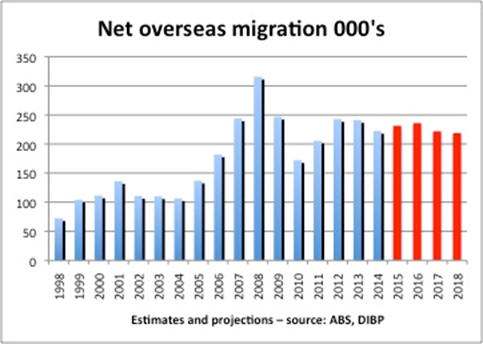An awkward time to mention migration
While all media attention is focused on Scott Morrison's hard-line approach to asylum seekers, an economically more important part of the immigration portfolio is getting scant attention.
A week ago the independent body set up to work out what skills Australia has, what it should import and how to develop home-grown skills, was quietly disbanded and its functions rolled into the Department of Industry.
Was it just a case of reducing the number of government agencies, or was the intention to stop the independent Australian Workforce and Productivity Agency disturbing a delicate balance in the Australian economy?
The government says the former, but one has to wonder.
The independent AWPA was only formed two years ago, replacing Skills Australia, and was given an expanded brief by the Gillard government to find out, through both top-down macro studies and bottom-up interviews with businesses, where our skills deficits lay.
So what balance could that possibly disturb?
Well, to start with, there's the government's shift to uncapped university fees, more 'diversity' and a true 'market' in university education.
Universities do a brisk trade selling, among other things, accounting degrees to overseas students, who often see that qualification as a stepping stone to permanent residency and a good job.
But if, as Fairfax papers reported yesterday, Australia has too many accounting graduates already, then who would want AWPA actually saying that in future?
AWPA's last report, before it went to defunct-agency-heaven, said the oversupply of accountants was only temporary – that things would pick up when economic growth returned. But even that statement highlights the problem of 'skilled migrants' who for the time being must find less skilled work.
Now that AWPA is gone, however, there is likely to be less scrutiny of the categories of jobs added to the government's 'skilled occupations list' that can be used to apply for a visa to migrate to Australia.
The government has just decided accountants should stay on the list, and has also added chefs, bricklayers and wall and floor tilers. In doing so, it cited AWPA evidence that they're in short supply – so why is it doing away with the body at the same time?
This all feeds into a very awkward problem for the government. As noted last week Roy Morgan Research's measure of under-employment paints a frightening picture of the economy, with hidden unemployment being particularly bad among the young (Trouble in the bedroom for housing investors, July 4).
But as the chart below shows, the Department of Immigration and Border Protection plans to keep overseas net migration pretty constant in the years ahead.
Moreover, the skilled migration component of the roughly 220,000 people moving to Australia each year will also stay roughly constant - about 49,000 each year through to 2018.

So the awkward questions that AWPA would have been asking in the months and years ahead are: are those new residents taking jobs that could be filled by existing residents, or, do those new migrants actually create jobs?
It is a very old question, and for a long time it has been accepted that, overall, migration is a source of economic growth, not a cost.
Labor's post-war immigration minister Arthur Calwell spelled that thesis out in an article for the Sydney Standard newspaper way back in 1946.
He wrote: "...there still remain a few who are tortured by the old bugbear that immigrants may take jobs now occupied by Australians. This, of course, is a fallacy ... in our expanding economy, and with the government's policy of full employment, immigrants will make jobs as well as take them. We need more and more workers for our developing industries..." (emphasis is Calwell's).
They were different times. The rapid ramp-up of migrant numbers on the chart above, from 2004 until the GFC hit in 2008, was a time in which both the Howard government and then Rudd government were terrified Australia would run out of the labour required to exploit a once-in-a-lifetime resources boom.
Workers flooded into the country, as much to replace those who'd gone to the mines as to head north themselves.
But the 'expanding economy' of Calwell's day, and the booming economy of Howard and Rudd's day, is already slipping away.
While GDP growth remains positive due to the huge volumes of resources being ferried to China and other customers, the actual number of jobs in that sector is already shrinking.
While AWPA's final report was upbeat enough about maintaining skilled migration, there are growing concerns that skilled migrants are taking jobs well below their skill level and therefore displacing young Australians who want jobs.
If ever there was a climate for an easy scare campaign, along the lines of Pauline Hanson's race-based nonsense, it would be now.
Having AWPA pumping out independent reports would be like handing out ammunition to Clive Palmer, the independents, or even Labor and the Greens – if, that is, they chose to use them.
As noted previously Treasurer Joe Hockey has inherited an economy characterised by competing forces – we need a couple of hundred thousand migrants every year to stop the out-of-control housing market crashing to earth, but bringing in such large numbers when work is in short supply will leave many younger, or even older jobless Australians angry (Hockey must work an economic miracle, April 11).
There are tens of thousands of new apartments about to be completed in Melbourne and Sydney in particular and strong migration numbers will help keep a floor under that market.
However, before long many Australian families will be asking what we're trying to achieve – growing GDP and growing house prices, or growing jobs, homes and a future for young Australians.
AWPA would have been at the heart of that debate, though of course that's not a debate any incumbent government would want to have in these economic times.
















